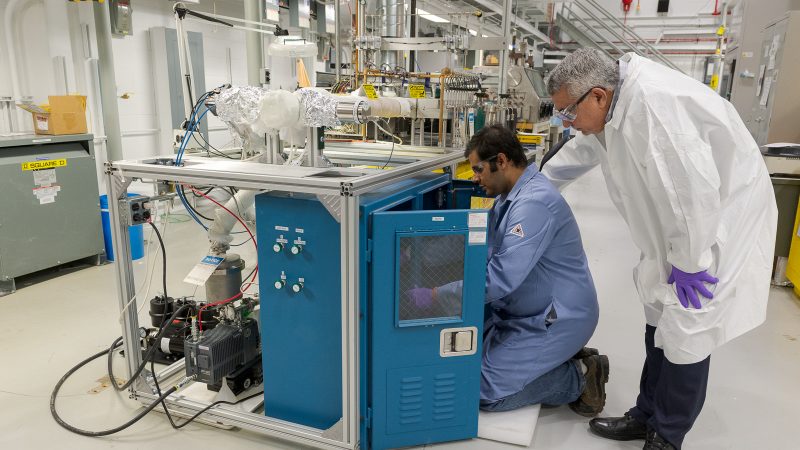Leon Lederman stands outside Wilson Hall at Fermilab on the day he learned he was awarded the 1988 Nobel Prize.
Leon Lederman was one of a kind.
This is the repository for all things C2ST. You can learn with videos of our past events, read articles concerning cutting-edge research and development in Chicago and elsewhere that will change our lives, check out C2ST in the news, and more! Use the Filter Media options below to browse C2ST’s content and discover something new!
We graciously thank The Brinson Foundation for their generous sponsorship of the C2ST Science Communication Internship in 2021-2024. As a result, an incredibly talented group of diverse STEM undergraduate and graduate scholars at area colleges and universities researched and developed over 100 blogs.* Enjoy-If you like, please share!
*As of 10.25.24

Comment by Robert Kriss, C2ST
Engineering professor Jian Cao had a favorite toy growing up — a construction set — and she spent many hours joyfully building with it. Today, the eminent scientist is an associate vice president for research and director of the Northwestern Initiative for Manufacturing Science and Innovation (NIMSI). Cao and her Chicago-based team are developing transformative technologies to shape manufacturing’s future. By harnessing the principles of engineering, computer science, physics, chemistry, and environmental science, Cao and NIMSI are creating the potential for better paying, more intellectually rewarding, and safer jobs in manufacturing — while also producing less expensive and better quality products. NIMSI is making technology work for workers and consumers while helping protect the environment. Read more about how this Northwestern research could change the “Rustbelt” to the “High Tech Heartland” here.

By Matt Golosinski
Originally published at: https://www.research.northwestern.edu/manufacturing-a-future-beyond-the-assembly-line/

By Argonne National Laboratory
Chain Reaction Innovations (CRI), the entrepreneurship program that embeds innovators for two years at the U.S. Department of Energy’s (DOE’s) Argonne National Laboratory, is expanding and will now be accepting applications in any technology area that can be accelerated to market by leveraging the vast resources available at Argonne National Laboratory. Previously applications were limited to technologies specifically related to advanced manufacturing.

By Jordan Greer
Are you a tea enthusiast or coffee connoisseur? A common debate in labs, offices, and possibly within your own home, people usually prefer one over the other to start their day. In fact, tea and coffee are the most commonly consumed non-alcoholic beverages in the world. But what leads us to choose one pick-me-up over the other, and how much of it we drink? While we may attribute our preferences to how we’re raised, recent research shows our choice of brew may also be linked to our DNA.
First, let’s consider what makes coffee and tea different. Both contain bitter compounds, although coffee contains a higher amount. However, their most noteworthy component is caffeine; coffee has roughly twice the amount found in black and green teas. Caffeine itself, though, is nearly tasteless – well, to most of us.
Continue reading “Coffee or tea? One cup or three? Your genes may decide.”
Originally published at: https://news.fnal.gov/2019/09/celebrate-the-extraordinary-life-of-nobel-laureate-and-former-fermilab-director-leon-lederman-in-chicago-on-sept-25/
Leon Lederman stands outside Wilson Hall at Fermilab on the day he learned he was awarded the 1988 Nobel Prize.
Leon Lederman was one of a kind.

By JARED SAGOFF
Originally published at: https://www.anl.gov/article/argonne-discovery-offers-new-way-to-coat-nuclear-materials
Inside an operating nuclear reactor, the environment is extreme, as reactor components are exposed to a combination of intense radiation and heat as well as chemically reactive coolant. That’s why, in order to operate reactors safely, scientists need to design their components with materials that can withstand these conditions.
Researchers at the U.S. Department of Energy’s (DOE) Argonne National Laboratory have made a pivotal discovery by taking a technique originally developed for the semiconductor industry and using it as a way to coat nuclear materials. This technique, called atomic layer deposition (ALD), forms the basis of new methods to protect nuclear fuels and materials from direct exposure to the reactor’s hostile environment.
“We are pioneering the use of ALD for nuclear applications,” Argonne nuclear engineer Abdellatif Yacout.
Continue reading “Argonne discovery offers new way to coat nuclear materials”